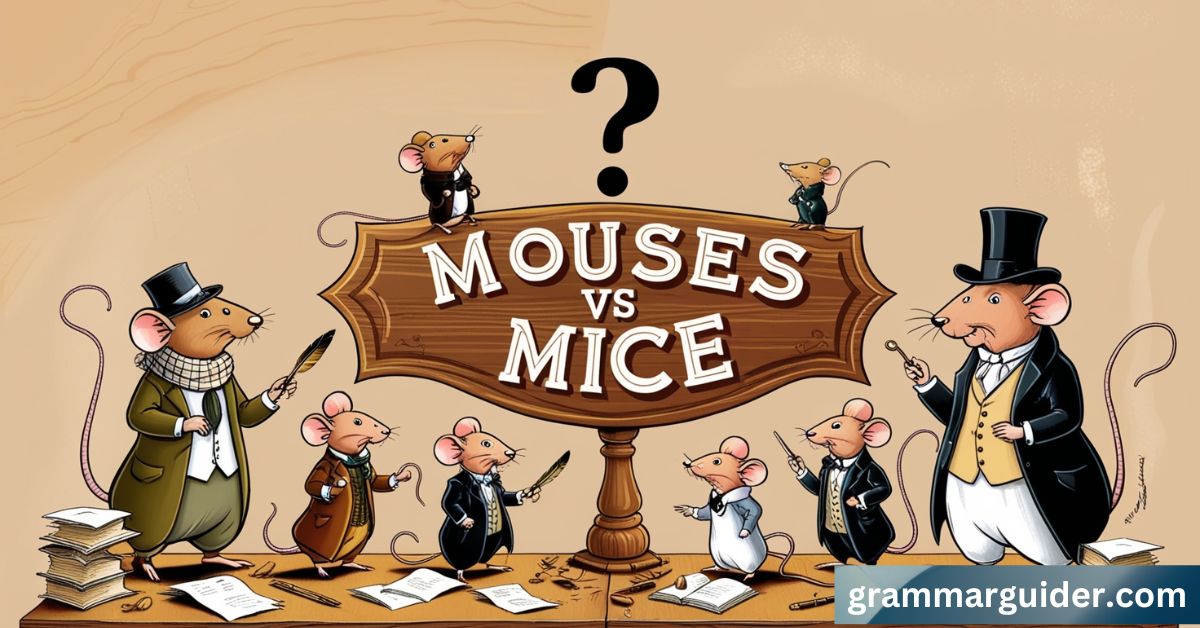The debate between mouses and mice as the plural form of mouse has been a long-standing discussion in the world of grammar and language. Most people may have heard the term mice when referring to more than one mouse, but does that always apply?
Or can you use mouses as well, especially in a technical context like computers? Let’s break it down and clear up this confusion once and for all.
What Is the Plural of Mouse?
The word mouse can refer to two very different things: the small rodent or the pointing device we use to interact with computers. And the plural form, mice, is often used for the animal. But, what about when it comes to the computer mouse?
The Animal: Mice Is the Plural
When you’re talking about the small, furry creature that scurries around looking for food, the plural form is definitely mice. Mice is the widely accepted, grammatically correct plural for this type of mouse.
Example Scenario: Imagine you’re chatting with a friend named Sarah, and you mention the following in an email:
Subject: A Funny Experience at the Zoo
Hey Sarah,
I went to the zoo last weekend, and I saw the cutest mice in the small animals section. They were running around and nibbling on bits of cheese—super adorable!
Hope you’re doing well!
In this case, mice is the correct plural for the rodent, and it fits perfectly into the context.
The Computer Mouse: Mice vs Mouses
When it comes to the computer mouse, the situation is a bit trickier. In the past, the plural of mouse for computers was mice. However, mouses is increasingly being accepted, particularly in tech-related discussions.
Mice – The Traditional Plural
You’ve likely heard the term mice used when talking about multiple computer mice. Historically, this has been the default plural of mouse in this context.
Example Scenario: Let’s say you’re working in a company and send an email to your colleague, John, about an office upgrade.
Subject: Office Tech Upgrade
Hi John,
I think it’s time we order some new mice for the office. The current ones are outdated, and a few of them don’t work properly anymore. Let’s look for some wireless options, shall we?
Thanks,
[Your Name]
In this email, mice works because you’re referring to the plural of the computer mouse. It follows the traditional rule for the animal as well.
Mouses – The Emerging Alternative
Some argue that mouses is a more appropriate plural for the computer mouse since the word is a piece of modern technology, and mice traditionally refers to the animal. While it’s not universally accepted, mouses has gained traction in more casual or technical environments, particularly in places where there are different types of computer mice or systems.
Example Scenario: Let’s say you’re troubleshooting some technical issues in a company-wide email.
Subject: Computer Peripheral Issues – Quick Fixes
Dear Team,
I’ve noticed that several mouses in the office aren’t functioning correctly after the recent update. Please ensure you check your settings and replace the batteries if needed. If the issue persists, let me know immediately.
Best,
[Your Name]
In this case, mouses refers to multiple computer mice and could be used depending on the context of the discussion. However, mice would still be understood, and the usage of mouses may feel a bit more technical or modern.
So, What Do You Call Multiple Computer Mouse?
If you’re wondering how to refer to more than one computer mouse, the correct term depends on your preference and the context of your conversation. Mice remains the most common and widely accepted plural. However, mouses is becoming more common, especially in tech communities where there may be a desire to differentiate between the animal and the device.
Here’s a quick comparison:
| Singular | Plural (Animal) | Plural (Computer) |
|---|---|---|
| Mouse | Mice | Mice (Traditional) or Mouses (Emerging) |
Mouse in Plural: Is It Always Mice?
For most scenarios, the plural of mouse will be mice, particularly when referring to the rodent or animals in general. However, if you’re talking about the computer mouse, you might encounter both mice and mouses, with mice remaining the more widely accepted term in formal contexts.
How to Use Mice or Mouses in Sentences
Let’s break down some more examples so you can see the terms in action.
Using Mice:
- Email to a colleague: Hi David,
I need to get a couple of mice replaced in the office. Do you have any recommendations for good models? - Describing the animals: At the pet store, there were so many mice to choose from. Some were white, and others were a brownish-gray.
Using Mouses:
- In a tech context: Our company recently upgraded to new mouses that allow for multi-touch gestures. They’re definitely more responsive than the old ones.
- When ordering supplies: We need to order more mouses for the marketing team—they’ve been using the same ones for years!
When to Choose Mice vs Mouses
So, which should you use: mice or mouses? Here’s the general rule:
- For animals, always use mice.
- For computers, mice is still the default, but mouses can work depending on the situation.
Why the Debate?
The reason mouses is creeping into everyday language is simple: language evolves. As we continue to use certain terms in modern settings, like tech and computing, new forms of pluralization develop. We see this with mouses as a more practical and distinct way to refer to computer mice without causing confusion with the rodents. However, grammar guides and traditionalists still prefer mice as the plural for both animals and devices.
Final Thoughts on Mouses vs Mice
When it comes to mouses vs mice, context is everything. For the rodent, the plural form is always mice. However, for the computer mouse, mice is still the traditional choice, though mouses is becoming more common in technical circles. There’s no one-size-fits-all answer, but understanding the different contexts will help you sound more polished and confident when discussing either one.
The next time you’re typing that email or discussing computer peripherals with your team, you’ll know exactly which plural form to use!

Harley Rose is a seasoned expert in English grammar and writing tips, blending years of knowledge and a love for language into her work. With a sharp eye for detail and a talent for making grammar accessible, Harley shares practical insights that help readers write with precision and flair. Her content is ideal for anyone looking to strengthen their writing skills and express themselves with confidence.

